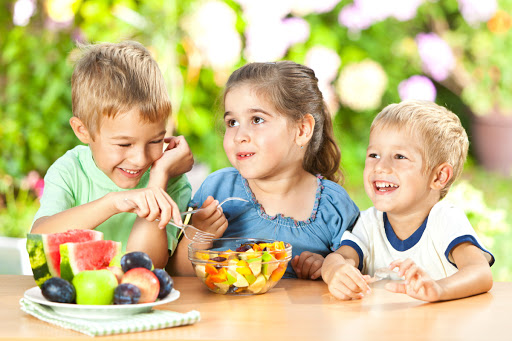It is not about demonizing or excluding foods or food groups. Instead, let’s celebrate what healthy food can do for us and how it can make us feel.
To get kids to eat more fruits and vegetables you have to start by teaching them to love the natural flavors and textures that fruits and vegetables provide. It is not about demonizing or excluding foods or food groups. Instead, let’s celebrate what healthy foods can do for us and how they can make us feel.
Serving fruits or vegetables in different shapes, textures, and temperatures will help children develop a mature palate, allowing them to indulge in a wider variety of new foods at once. Training kids to meet and accept new tastes would help them develop a natural approach to real food.
Tips to achieve healthy habits
1) Four meals a day
It is not recommended that kids are allowed to eat at any time of the day, as there will not be enough appetite at the time of sitting down to make any of the 4 corresponding meals (breakfast, lunch, snack, and dinner). It’s okay for kids to be hungry, and even encourage them to be, this way when mealtime comes around, they will be less picky, and healthy foods will actually taste better for them.
2) Variety of proteins
Protein is vital for the growth of the brain and body of children. Protein can be obtained from beef, poultry, seafood, eggs, dairy products, dried fruits such as walnuts and almonds, and also seeds. All of these products are good sources of protein and all should be included in a child’s diet and they generate a virtuous cycle that feeds itself. Eating these products improves health and accustoms the palate for life to this type of food.
3) eat less sugar
The average child receives 16% of their total calories from added sugars, something that is directly related to childhood obesity, chronic diseases such as diabetes, and behavior problems. Replacing sweets, jams, packaged cookies, bills, and others with homemade recipes is much healthier because we control the amount of sugar we use and avoid excess fat in industrialized foods. Do not prohibit them, but keep them occasional.
4) Make half of your food fruits and vegetables
Increased consumption of fruits and vegetables in all their forms and varieties has been linked to higher immunity, lower incidence of cancer, and lower weight gain. A balanced meal occurs naturally when children consume fruits and vegetables at every meal as they are filling up on foods high in fiber, high in nutrients, and low in calories. And in the right portions.
5) Include fish once a week
Fish is rich in omega 3 fats, such as DHA, which is vital for brain development. Additionally, omega 3s are linked to reduced inflammation in patients with asthma, arthritis, and eczema. It is not very common for children to consume Omega 3, so it is important to check what foods they contain to get them used to their consumption. Omega 3 deficiency can be a risk factor for future illnesses.
6) Choose whole grains
To feed your children grain-containing foods in addition to bread which can be wholemeal, bran, or white, you can also find other delicious alternatives that are much healthier for children such as brown rice, cereals, millet, barley, legumes, quinoa, etc.
7) Limit processed foods
Processed foods are all foods that are pre-made and even pre-cooked. They come packaged and usually contain chemicals like preservatives, added fats, and added sugars just so you can keep them on store shelves without going broke. Children who eat and have access to processed foods eat fewer fruits and vegetables and develop eating habits that lead to obesity and poor health. The amount of carbohydrates, salt, or sugar they contain makes them very addictive. Preparing food at home with raw materials that are not precooked, planning weekly meals and if possible growing your own food are easy ways to eliminate the need to buy processed foods.
8) Drink water
Water is vital for everyone, but getting children used to drinking water is a very important task. The main source of added sugar for children comes from sugary drinks. Sugar-sweetened beverages have been blamed for many of the health problems afflicting children today, especially obesity and childhood diabetes. These drinks also replace foods that have nutrients and fiber, which children need to grow.
9) Play a lot and sleep well
When children spend several hours of the day outside and go out to play outdoors, instead of being in front of a screen, in addition to exercising their body, they spend a lot of energy that they will later want to replace by eating foods such as fruits, smoothies, cereals, etc. . In addition, everything playful exercises the brain and imagination and tires them, something that will facilitate them to have a better rest. Of course, they are happier and even have a better image of themselves.

